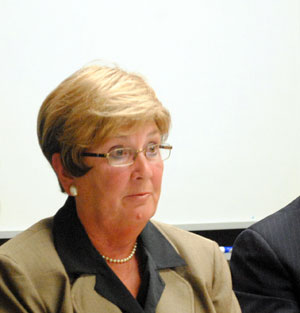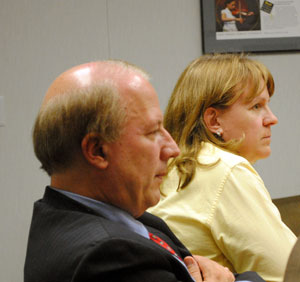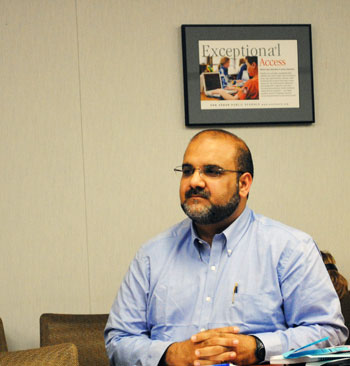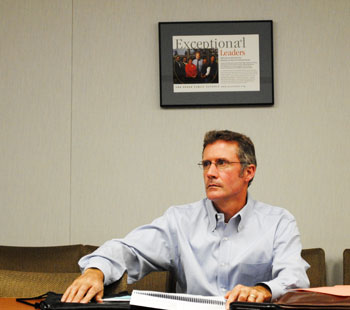AAPS Admin Meets Board Candidates
Editor’s note: Jennifer Coffman covers Ann Arbor Public Schools board meetings for The Chronicle.

Patricia Green is the new superintendent of the Ann Arbor Public Schools, a job she started this summer. (Photos by the writer.)
To develop additional background understanding of the board, she attended a recent forum for candidates in the Nov. 8 school board elections. The forum was hosted by AAPS staff. Other media reports from that forum raised questions about what was actually said at that meeting. So The Chronicle asked Coffman to write up her notes from that forum.
Four of the six candidates running for AAPS school board met with top AAPS administrators for an informal question-and-answer session held at the Balas administration building on Aug. 23, 2011.
After brief introductions, Patrick Leonard, Larry Murphy, Ahmar Iqbal, and Albert Howard asked administrators for more information about a variety of topics.
Those topics ranged from busing, to the district’s role in school board elections, to prayer in public schools. The two incumbents in the race – board secretary Andy Thomas and trustee Simone Lightfoot – did not attend the forum.
Introductions
AAPS director of communications Liz Margolis welcomed everyone to the meeting, and attendees briefly introduced themselves. Each of the seven administrators in attendance also gave a brief overview of the scope of his or her department within the district.

At left is Dave Comsa, assistant superintendent for human resources and legal services. To the right is Nancy Hoover, director of finance.
In addition to Margolis, AAPS was represented by: Sara Aeschbach, director of community education and recreation; Elaine Brown, assistant superintendent for student intervention and support services; Dave Comsa, assistant superintendent for human resources and legal services; Nancy Hoover, director of finance [sitting in for Robert Allen, deputy superintendent of operations]; Joyce Hunter, assistant superintendent of secondary schools; and superintendent Patricia Green.
Also present was AAPS elections coordinator, Teri Williams. Williams said it was great to see so many people running for the board, and she urged all candidates to be sure to follow all the campaign rules and regulations, and to be sure that their supporters are also aware of the rules. When campaigns get exciting, she cautioned, it’s easy to make mistakes regarding finance or other areas.
Busing Service Changes
By way of background, for the 2011-12 school year, AAPS has begun enforcing a 1.5-mile walk zone for all students, has eliminated 7th hour busing at the middle schools, and limited high school bus service to common sites, most of which are at elementary schools. The cuts to bus service are projected to save the district $1.3 million this school year.
Albert Howard opened a discussion on the new busing system that was unveiled by district officials in mid-August. He asked whether the administration had resolved concerns expressed by families at the Arrowwood Hills housing cooperative about busing changes, and suggested that AAPS officials had not followed through on setting up a promised meeting with Arrowwood representatives.
Liz Margolis responded that bus schedules are always released at this time of year, and that there was a meeting scheduled at Arrowwood two days from then, on Thursday, Aug. 25 at 6 p.m. Patricia Green added that representatives from the Washtenaw Intermediate School District (WISD), with whom AAPS currently contracts for bus service, would attend the meeting as well.
Patrick Leonard commented that there seems to be a “disconnect” between AAPS and the community, and asked about how the district had communicated the busing changes to parents.
Margolis noted that a complete back-to-school guide, including bus schedules, was available on the district’s website. She has been holding community meetings and using phone calls and e-mails via School Messenger software to communicate with parents as well, she said.
Green added that AAPS did not want to cut these services, and that in a perfect world, the district would not have had to cut them. She said the district was trying to be responsive to community concerns. But she wanted to open the school year and give the transportation professionals a chance to see how this will “flow or not flow.”
[At the Arrowwood meeting on Aug 25, Margolis echoed this sentiment, saying that no changes would be made to the new transportation plan until after school had started and officials had a chance to evaluate the stops as they were originally planned.]
Green explained that the district wanted to use a medical model and identify the root cause of any problems, rather than offer “splintered-off” solutions in only some neighborhoods.
Larry Murphy asked why the district could not simply use a single bus to collect all students, K-12, from one neighborhood. Margolis explained that many parents are not comfortable with elementary students riding with middle and high school students. She also said the district is looking into moving from the current three-tiered system to a two-tiered one in which middle and high school students would share buses.
Ahmar Iqbal asked if the Ann Arbor Transportation Authority (AATA) could be part of the solution, and Margolis indicated the district has been in regular discussion with AATA. She noted, however, that the AATA is similarly financially constrained, and is also not legally allowed to dedicate service exclusively to AAPS riders.
Leonard asked if there was an emergency plan in place, in case problems arose quickly.
Green asserted that she wants to provide a strategic viewpoint for the community. She said she had driven around the Arrowwood, Northside, Carrot Way, and Foxfire neighborhoods to “get a visual feel for what is out there,” and that the district would do the very best it could to support the opening of school. Green also said that the WISD transportation supervisors were “on notice” in case adjustments needed to be made, but confirmed there would be no changes “until the buses roll … [Otherwise,] everyone will say, ‘I want a bus. I want it the way we had it last year.’”
In a phone conversation with Margolis on Sept. 11, The Chronicle confirmed that one elementary bus stop was added during the first week of school at the corner of Birchwood and Dhu Varren. The stop is for the two families in the Foxfire subdivision who, upon re-measuring, were deemed to be just outside the 1.5-mile walk zone to Logan Elementary School.
In addition, Margolis said, three new bus stops will begin Monday, Sept. 12 for high school students heading to Skyline – one at the corner of Dhu Varren and Omlessad, a second one at Carrot Way apartments, and a third at Arrowwood Hills housing cooperative. Margolis also noted that 10 other stops, in addition to those three, have been added throughout the district. More stops may be added during the week of Sept. 12, as safety concerns and ridership levels continue to be evaluated.
Tenure, Evaluation, and Collective Bargaining Changes
By way of background, in July 2011, the Michigan legislature passed, and Gov. Rick Snyder signed into law, a set of four tie-barred bills (PA 100-104) affecting teacher tenure, collective bargaining, discipline, layoff and recall, and evaluation, among other items.
Iqbal asked what the immediate impact of the bills has been on AAPS, and how the district will plan to accommodate the new requirements.
Comsa responded that the bulk of the changes brought about by the new laws affected teacher evaluation systems, and certain items that are now off limits during collective bargaining discussions. Comsa said that AAPS has been at the forefront of designing a new teacher evaluation system that will comply with the new law, and that the district’s evaluation system will have the requisite rigor and accountability built into it.
Green noted that the evaluation system, which she said uses the nationally-respected “Danielson Model,” has been crafted collaboratively with AAPS teachers and principals.
Iqbal asked about the cost of the new evaluation system, and Comsa said the cost is negligible, since training can be done in-house.
Iqbal then suggested that the district should advocate to get its evaluation model recognized by the state’s blue ribbon commission as the state template. He said the evaluation model as developed by AAPS should be usable to benchmark against other districts.
Campaign Process
Iqbal suggested that the district hold forums for candidates to meet parents, but Margolis said the district does not handle organization of candidate campaigns. Iqbal then appealed to Green directly, suggesting that she could start a “new tradition” to allow candidates to hold rotating discussions with voters in different schools each week, because “going door-to-door has its challenges.”
Green said that would be not appropriate, and explained, “There is a line across which we cannot step in terms of our time being paid by taxpayer dollars.”
Williams noted that historically, when the school board election calendar called for June elections, it was common for candidates to attend the ice cream socials held in the spring at the elementary schools. Now, Williams said she was not sure which district events would be open to candidates.
Margolis offered to provide candidates with school and district-wide calendars. She also suggested campaigning at football games, or asking Brit Satchwell, president of the teachers union, if the union would be interested in hosting a forum.
Williams also suggested that the Ann Arbor Area League of Women Voters (LWV) often holds a candidate forum for contested races. Murphy said he thought the LWV would hold one for school board candidates. [As of Sept. 11, the LWV website lists a candidate forum for board of education candidates to be held on Monday, Oct. 3 at the Community Television Network studio at 2805 S. Industrial Highway in Ann Arbor. The forums are typically broadcast live on CTN Channel 19.]
Iqbal then suggested perhaps that Sweetwaters coffee shop, as a local entity, might want to host a forum. Iqbal said he would welcome a way to make it easier for people to meet the candidates, and help candidates to be more transparent with the community. If there were more forums, Iqbal said, a better-informed voting public could emerge. Leonard and Murphy expressed support for a forum. Howard did not comment.
Legislative Advocacy
Iqbal commented that, as the fourth-largest district in Michigan, AAPS should be playing a leadership role in advocating for taxpayers to “have a choice about how to fund schools.” He asked how AAPS works with the state board of education and state superintendent of schools.
Margolis noted there are a large number of parent advocacy groups working for changes to school funding. She also pointed to the work of the local group Michigan Parents for Schools.
Green said she was comfortable advocating for more local control, and that she had joined the Michigan Association of School Administrators, and was working with other superintendents in the district to advocate as a group.
Board/Administration Relationship
Iqbal asked how open Green was to having different views than the board. She answered that she acts on behalf of the board, but not individual board members. Once the board acts or takes a stand, she said, that’s where the administration is guided.
By way of illustrating the beginning of a good working relationship, Green related feeling honored that board president Deb Mexicotte asked Green to attend and participate in a conference with her in mid-August. “It is very important that the board and the administration are a team,” she said.
Food Service
Howard asked what the food was like at AAPS schools and whether there might be a connection between the flavored milk being offered and the number of students with diabetes.
Aeschbach, in her role as district facilitator for school wellness, invited Howard to visit a school cafeteria, and said that the quality of the food has improved substantially.
She noted that AAPS has doubled or perhaps tripled its consumption of produce in school cafeterias, and has fresher food cooked on the spot as part of its “Environments” program. She did acknowledge that the offerings are not perfect, saying, “There are items that are questionable to serve in a school cafeteria.”
Howard commented that he and his family try to have a vegan lifestyle, but that he does drink Gatorade. He argued that there are different eating patterns among the 16,500 AAPS students and that he hoped the district could “tighten up” the foods offered in the school cafeterias.
Budgeting Process
Murphy asked Hoover if the district was already at work on next year’s (2012-13) budget, and Hoover responded that no, currently her department is working on the year-end audit.
Murphy suggested that the district should get the budget out to the public earlier, noting that some of the athletics cuts happened quickly. “If we had gotten started earlier,” he argued, “we could make some better decisions.”
Green said she and Allen had discussed beginning the 2012-13 budgeting process as early as October so information can be shared with the public even earlier.
Hoover noted that this was the first year the district had known in advance what the funding would be, because Gov. Rick Snyder passed a budget before the district’s fiscal year began on July 1.
Title IX
Leonard asked Comsa whether the new cuts to athletics had left AAPS compliant with Title IX requirements, and Comsa acknowledged that there had been some inquiry into that. But Comsa said he viewed the district as compliant. All sports don’t have to be equally funded, he said — it’s based on opportunity.
Status of Collective Bargaining Agreements
Iqbal asked Comsa to summarize the status of the district’s collective bargaining agreements. Comsa replied that AAPS has contracts with all but one of its eight bargaining units. The paraprofessionals union, Comsa said, has had a change in leadership which has delayed negotiations.
Iqbal asked how contract negotiations can be re-opened. Comsa replied that the current teachers’ contract has a revenue-sharing formula built into it, but that normally it’s date-driven, with each contract having deadlines built into it before its term ends.
Health Care Dependent Audit
Iqbal asked if the district had made an effort to recover the large sum of ambiguous health care dependent claims that an audit had recently uncovered.
Comsa answered that he was looking into that process, as was outside counsel. Comsa said he could not speculate how much it might bring the district.
The Bible and Prayer in Public Schools
Howard asked Comsa if he would be willing to allow the use of the Bible in AAPS as a historical book. Comsa answered that the use of the Bible in public schools in the context of history is allowed, but not mandated, under both the Michigan and U.S. constitutions. Comsa also explained that the establishment of the curriculum is under the purview of the board.
Howard then asked Green, “What is your stance on prayer in the public schools,” to which Green answered that she does not have a stance, but that AAPS follows the law.
Next regular meeting: The next regular meeting of the Ann Arbor Public Schools board of education will be held Wednesday, Sept. 14, 2011 at the Ann Arbor District Library fourth floor board room, 343 S. Fifth Ave., at 7 p.m. [confirm date]








“Howard commented that he and his family try to have a vegan lifestyle, but that he does drink Gatorade”… note to Howard: Gatorade does not include real Gators.
Readers may be interested in some recent comments made by Mr. Howard at the Ann Arbor Schools Musings blog (see comments under blog entry): [link] h
If Mr. Howard is elected President, would he step down from his School Board position?
[link]
And why do I need to Google his name to find out this stuff?
Woo hoo, Alan, that is a great find.
I would add that Mr. Howard’s blogger profile [link] says, in part: “Albert Howard is the creator of Operation “King of Islam” which seeks to ban the Quran and all mosques in North America, Europe and Canada. With $55,600, Albert Howard is the first person in U.S. history to receive a statewide New Hampshire Primary Recount. “ABC World News” confirms our website prophecy shut down the Hillary Rodham Clinton presidential campaign.”
Wow. Good thing we have plenty of choices for school board this year.